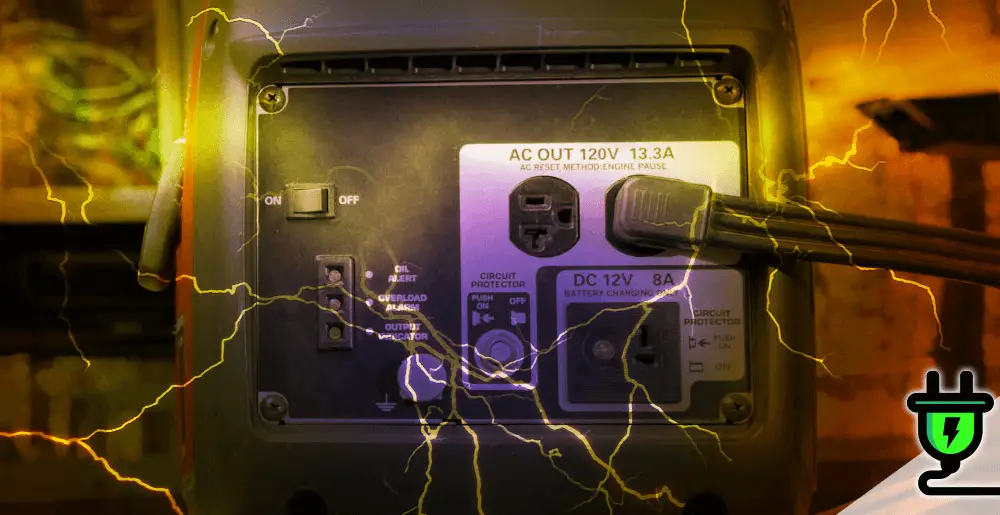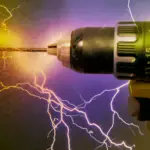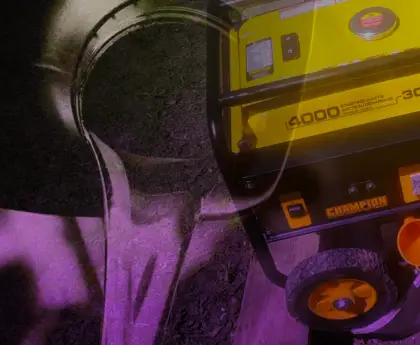Whether you’re thinking of investing in a regular generator or already own one, it’s essential to be aware of its downsides. So, what are the cons of a regular generator?
Each time there is a power outage, you will need to wheel your generator out of storage, connect it to a transfer switch, and start it up. To endure an extended power outage, portable generators need to be periodically refueled.
This article aims to bring light on the cons of owning a regular generator from different perspectives – portable generators, home generators, and inverter generators alike.
Excited? Read along for unforeseen insights!
Limitations of Portable Generators
Portable generators have limited usage and wattage, making them unable to power entire households. Here are the cons of a regular generator to consider.
Limited usage and wattage
Regular generators typically possess a set wattage limit. This limitation heavily influences what appliances and devices you can power up simultaneously. For example, if your generator has an output of 5kW, it might handle some lights, the fridge, and a few electronics. But trying to use it for larger electrical needs like heating or cooling systems will prove futile.
Even smaller necessities like laptops or modern kitchen appliances could stay dark depending on demand.
Inability to power entire households
Regular generators have a significant limitation when it comes to powering entire households. Due to their limited wattage and power output, they may not be able to support all the electrical needs of a household.
This means that you may have to prioritize which appliances or devices you want to power during an outage, as running everything simultaneously could overload the generator. So, if you’re looking for a solution that can provide electricity for your whole house during emergencies or outages, a regular generator might not be the best choice.
Noise, exhaust, and heat emissions
Regular generators are known for their noisy operation, emissions, and heat production. These factors can create a disturbance in the surrounding environment and pose potential health risks.
The noise generated by regular generators can be quite loud, making it difficult to have conversations or enjoy peace and quiet. Additionally, the exhaust emitted from these generators contains harmful gases like carbon monoxide which can be dangerous if used in enclosed spaces without proper ventilation.
Moreover, regular generators produce a significant amount of heat while running, adding to the overall discomfort.
Manual start requirement
Regular generators often require a manual start, which can be time-consuming and inconvenient. Instead of being able to switch on the generator with ease, users need to physically pull a cord or engage a starter mechanism.
This manual start requirement adds an extra step and may take several attempts before the generator starts running. In emergency situations where power is needed immediately, this delay can be frustrating and potentially problematic.
Disadvantages of Home Generators
Home generators are an expensive investment with sporadic use and space requirements in the yard. Discover more drawbacks of home generators here.
Expensive investment
Regular generators can be quite an expensive investment. Not only do you need to consider the initial purchase cost, but also the ongoing expenses associated with maintenance, fuel, and repairs.
Additionally, if you opt for a standby generator that automatically kicks in during power outages, the installation costs can add up as well. It’s important to carefully weigh the benefits against the financial commitment before deciding if a regular generator is worth it for your specific needs.
Sporadic use
Regular generators are often only used sporadically, which can be a drawback for some users. Unlike inverter generators that can run continuously for longer periods of time, regular generators may require more frequent breaks and refueling.
This means that if you rely on your generator for constant power supply, you may need to constantly monitor and maintain it. Sporadic use also means that the generator is not being fully utilized, leading to wasted energy and fuel.
Additionally, when a regular generator is only used occasionally, it may be more prone to mechanical issues or failure due to lack of regular usage and maintenance.
Space requirements in the yard
Regular generators typically require a significant amount of space in the yard. These generators are larger and heavier compared to other types, such as portable or inverter generators.
Due to their size, they may take up more room and make it difficult to find a suitable location for installation. Additionally, regular generators often require proper ventilation and distance from other structures for safety reasons.
Therefore, potential buyers should consider the available space in their yard before investing in a regular generator.
Need for fuel storage
Regular generators require fuel storage, which can be inconvenient and pose potential safety hazards. Fuel needs to be stored in containers, typically gasoline or diesel, and kept on hand for refueling the generator when needed.
This means that you need to allocate space for storing the fuel, which can take up valuable yard space or require additional storage areas. In addition to the physical space requirements, there are also safety considerations when storing flammable fuels.
It’s crucial to follow proper storage protocols to prevent any accidents or leaks that could result in fire or other dangers.
Noise production
Regular generators are known for their noisy operation, which can be a significant drawback. Unlike inverter generators that provide quieter operation, regular generators produce more noise levels that can cause potential disturbance to the surrounding environment.
This increased noise production can be particularly bothersome in residential areas where peace and quiet are valued. It is important to consider this factor when choosing a generator, especially if you live in close proximity to your neighbors or have specific noise regulations in your area.
Another point to keep in mind is that the noise emitted by regular generators can affect your own comfort as well. If you plan on using the generator frequently or for extended periods of time, the constant loud humming may become an annoyance.
Downsides of Inverter Generators
Inverter generators have higher price compared to regular generators and take longer time for installation. Read more to learn about their drawbacks.
Higher price compared to regular generators
Inverter generators, while offering numerous advantages, also come with a higher price tag compared to regular generators. This means that you may have to invest more upfront to purchase an inverter generator.
However, it’s important to consider the long-term benefits and cost savings that these generators can provide. Inverter generators are known for their fuel efficiency, which can result in lower ongoing fuel expenses over time.
Additionally, they often require less maintenance and servicing compared to regular generators, which can help offset the initial higher cost. So while the price may be higher initially, choosing an inverter generator could save you money in the long run.
Longer installation time
Regular generators often require a longer installation time compared to other types of generators. This is because they typically need more complex wiring and electrical work to be set up properly.
The process may involve connecting the generator directly to your home’s electrical system, installing transfer switches, and ensuring proper grounding. Additionally, regular generators may require professional assistance for installation due to their larger size and weight.
It’s important to consider this additional time and effort required when deciding on a generator for your needs.
More expensive to buy and install
Regular generators tend to be more expensive compared to other types of generators. The initial cost of buying a regular generator can be higher, as they are typically larger and have more powerful engines.
Additionally, the installation process for regular generators may also require professional assistance, which adds to the overall expense. Along with the purchase and installation costs, regular generators generally require ongoing maintenance and fuel expenses, further increasing their total cost over time.
Considering these factors, it is important to carefully weigh the financial implications before investing in a regular generator.
Cons of a regular generator FAQs
Are regular generators noisy?
Yes, regular generators can be quite noisy due to the combustion engine that powers them.
Can a regular generator produce harmful fumes?
Yes, regular generators emit exhaust fumes that contain carbon monoxide, which is a poisonous gas and can be dangerous if inhaled in high concentrations.
Do regular generators require frequent maintenance?
Yes, regular generators require regular maintenance such as oil changes and filter replacements to ensure proper functioning and longevity.
Are fuel costs high for running a regular generator?
Regular generators typically run on gasoline or diesel fuel, which can be expensive depending on current prices and usage requirements.
Conclusion: Cons of a regular generator
Truth is, regular generators come with a range of drawbacks that can make them less than ideal for certain situations. From limited usage and noise emissions to the need for manual start-up and maintenance, these generators may not be the best choice for those seeking convenience and efficiency.
However, it’s important to weigh the pros and cons carefully before making a decision, as different types of generators have their own unique advantages and disadvantages.






